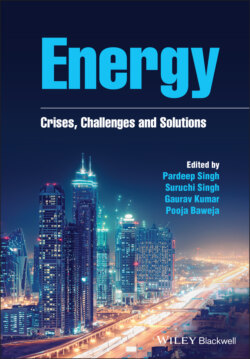Читать книгу Energy - Группа авторов - Страница 24
1.9 Conclusion
ОглавлениеToday, the world is caught up in an energy crisis that has adversely affected substantial measures to decrease GHG emissions from the oil industry and to reduce the risk of a global energy crisis.
Invariably, fossil fuels are a lifeline for human civilization and millions of others around the world. The availability of fuel is not infinite, which is why people are willing to fight for it and to align themselves with their adversaries. Exploration and development are currently underway for other renewable energy sources, most of which have only passed their early stages. The evolution of these technologies can be accelerated by growing government funding and public support, helping free society from the reckless use of fossil fuels. During this massive transition, oil companies will remain resilient because, with the depletion and exhaustion of fossil resources in the future, they would make big profits. To prevent this, it is important to encourage the oil sector and other energy resource companies to look beyond their commercial profits and concentrate on developing alternative strategies when all fossil fuel resources are being depleted.
As a result of the increased concentration of carbon dioxide and other greenhouse gases in the atmosphere resulting from the burning of fossil fuels, we have seen the convincing scientific evidence that the Earth’s surface is continuously heating up and its average temperature is increasing. The resulting global warming would eventually manifest itself in the form of significant changes in the Earth’s atmosphere, which would have a major impact on human life and the world as a whole. Strong efforts are needed to promote renewable energy and minimize the use of fossil energy to avoid this. The aim must be to reduce energy consumption, which can be done by combining multiple factors, including the minimization of energy demand, the equal use of energy and the abundant use of green energy. The primary objective of this analysis was to take a step forward in achieving this objective. Creating green or sustainable solutions for managing society can be seen as an important response to the energy crisis. The implementation of renewable energy generation approaches and the discovery of ways to use these alternatives as green energy sources are crucial factors in reducing CO2, which contribute significantly to global warming. While land availability is relatively modest, comprehensive and sustainable agriculture programmes provide significant energy and economic and environmental benefits that could be disseminated in rural areas where they are necessary and can link to further economic growth in rural areas. In this way, all countries will benefit from foreign exchange savings, increased energy security and socio‐economic developments. The country’s resource base can be dramatically strengthened by tree planting and forest expansion. The community at the international level would benefit greatly from carbon reduction, climate mitigation and enhanced trade opportunities that would lead to new income sources. In addition, environmental and environmental factors, including carbon sequestration and reforestation, renewables as a replacement for CO2 for fossil fuels, are non‐technical approaches that can make a significant contribution to climate restoration. More attention should be paid to the importance of renewable energy and the difficulties of gathering good and accurate renewable energy data at the policy and planning level.
